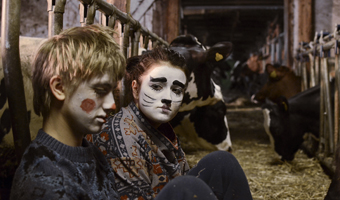Eat Sleep Die
Äta Sova Dö
Gabriela Pichler

A young Eastern European immigrant working in Sweden is faced with a painful choice when she's laid off from her factory in the name of "efficiencies." With No high school diploma, no job – but her boots deeply stained with the mud of the small town she grew up in...
With : Nermina Lukac, Milan Dragišic, Peter Fält, Ružica Pichler, Jonathan Lampinen
Screenplay : Gabriela Pichler
Image : Johan Lundborg
Sound : Martin Hennel
Editing : Gabriela Pichler, Johan Lundborg
Music : Andreas Svensson, Jonas Isaksson
Screenplay : Gabriela Pichler
Image : Johan Lundborg
Sound : Martin Hennel
Editing : Gabriela Pichler, Johan Lundborg
Music : Andreas Svensson, Jonas Isaksson
Production : Anagram Produktion // Tel : +46 (0) 46 15 97 50 // Email : info@anagram.se
Distribution: ASC distributions, Philippe Leroux / 52, rue de Montreuil, 75011 Paris // Tel.: +33 1 43 48 65 13 // Email : ascdis@orange.fr
Distribution: ASC distributions, Philippe Leroux / 52, rue de Montreuil, 75011 Paris // Tel.: +33 1 43 48 65 13 // Email : ascdis@orange.fr

Gabriela Pichler was born in Huddinge, Sweden and attended film school in Gothenburg. She has directed the short films Nångång (2004), Leda (2007) and Scratches (2008), which won prizes at Munich, Karlovy Vary and the Uppsala Short Film Festival. Eat Sleep Die is her debut feature.
"I wanted to make a film about the people I've always loved – but was ashamed to be part of. I wanted to redefine the Swede's image of Sweden and national identity. I wanted the leading role to be an intense, cocky, straight- forward Muslim working class girl who doesn't give a shit what others think about her. I wanted to portrait a father-daughter relationship I never got to see on screen when I was a young girl. I wanted to tell the story about young people today, in the midst of the European unemployment crisis, trying to adapt to a contradictory society." Gabriela Pichler
"I wanted to make a film about the people I've always loved – but was ashamed to be part of. I wanted to redefine the Swede's image of Sweden and national identity. I wanted the leading role to be an intense, cocky, straight- forward Muslim working class girl who doesn't give a shit what others think about her. I wanted to portrait a father-daughter relationship I never got to see on screen when I was a young girl. I wanted to tell the story about young people today, in the midst of the European unemployment crisis, trying to adapt to a contradictory society." Gabriela Pichler
